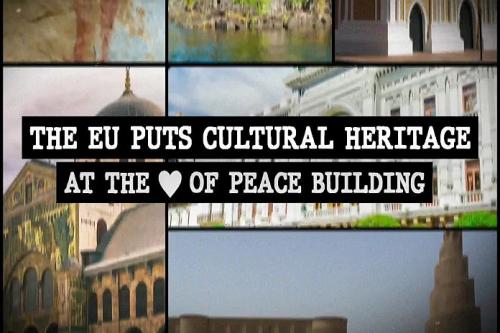
In numerous conflicts and crises around the world, cultural heritage has increasingly become a symbolic front, mostly as a direct target for belligerents who use the destruction of culture as a means to foster violence and forcibly transform peoples’ identities. Images of such destructions – be it the Buddha statues of Bamiyan, Afghanistan in 2001, the tombs in Timbuktu, Mali in 2012 or the ancient oasis city of Palmyra, Syria in 2015 – have left deep scars in our collective memory as citizens of the world. Numerous resolutions adopted at international level already underline that destruction of cultural heritage poses a threat to cultural rights and that cultural heritage can be a tool for organised crime and financing of terrorism.
Protecting and promoting cultural heritage is an imperative for long lasting peace and security.
The European Union has gradually developed a political and operational framework for its international cultural relations, taking into account the need to protect cultural heritage.
The Council Conclusions adopted on 21 June 2021 and the associated Concept on EU approach to cultural heritage in conflicts and crises provide an important contribution to the EU’s strategic approach to peace, security and development. This is a valuable addition to the EU toolbox in the framework of the EU Integrated Approach for Peace and Security as it connects two dimensions that do not traditionally interact: security and culture.
The EU now recognises cultural heritage as a vector for peace, reconciliation, mutual understanding, intercultural dialogue and sustainable development. The Conclusions and the Concept provide key principles and an operational approach for EU strategic engagement throughout all the conflict cycle: from preventive actions to safeguarding measures and recovery processes.
Yesterday’s #FAC adopted conclusions on EU approach to cultural heritage in conflicts and crises. Cultural heritage is part of our foreign policy toolbox. It is imperative for lasting peace and we put cultural heritage at the heart of peace building. europa.eu/!xw37crK pic.twitter.com/r1SnyXG8lo
Next steps
The EU will now integrate the protection of cultural heritage into all the relevant dimensions of the EU toolbox for conflicts and crises.
As CSDP missions and operations can provide an important contribution to address security related challenges linked to the preservation and protection of cultural heritage, the EU will now explore possibilities to develop civilian CSDP missions’ efforts, where appropriate, in this field, such as through possible capacity building programmes or training activities.
At present, the European Union Advisory Mission EUAM Iraq is the only CSDP mission with a dedicated tasking on cultural heritage in its mandate. Protecting cultural values, enhancing the Iraqi inheritance and preventing the root causes of extremism are among the key factors in the stabilisation efforts in Iraq. In 2018-2020, the mission organised three conferences to fight illegal excavations, looting and trafficking in cultural properties, uniting international and Iraqi key actors to stem money-making by criminals and terrorists.
The EU will also seek to integrate the protection of cultural heritage in all other areas of the EU’s external action and in appropriate financial instruments, including the newly created Neighbourhood, Development and International Cooperation Instrument (NDICI) – Global Europe.
The European Union has already engaged on concrete actions in this field and will enhance its support to cultural heritage in this context, building on flagship initiatives such as:
Iraq: Reviving the Spirit of Mosul and Basra
Iraq’s most emblematic historical cities were left destroyed by the occupation of the Islamic State, the EU seeks to heel wounds and contribute to promote social cohesion and reconciliation through the restoration and reconstruction of historic urban landscapes. The project is funded by the European Development Fund and is conducted in partnership with UNESCO. It will run until 2022.










Add new comment